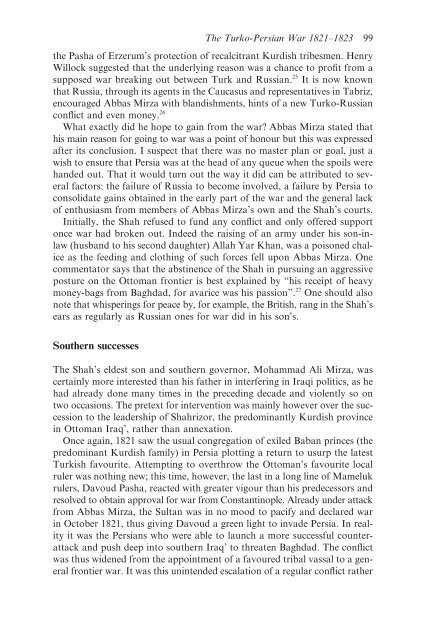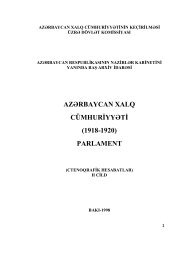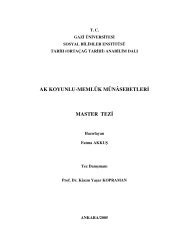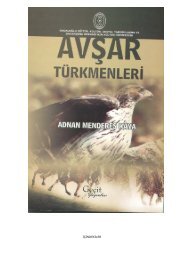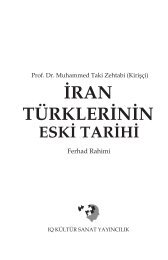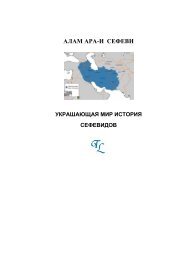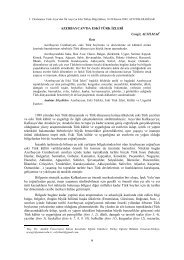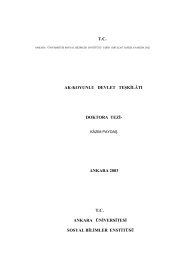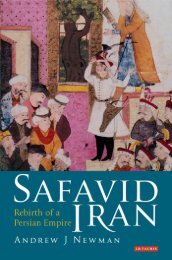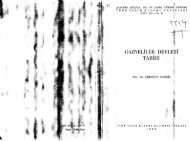War and Peace in Qajar Persia: Implications Past and ... - Oguzlar.az
War and Peace in Qajar Persia: Implications Past and ... - Oguzlar.az
War and Peace in Qajar Persia: Implications Past and ... - Oguzlar.az
- No tags were found...
You also want an ePaper? Increase the reach of your titles
YUMPU automatically turns print PDFs into web optimized ePapers that Google loves.
The Turko-<strong>Persia</strong>n <strong>War</strong> 1821–1823 99the Pasha of Erzerum’s protection of recalcitrant Kurdish tribesmen. HenryWillock suggested that the underly<strong>in</strong>g reason was a chance to profit from asupposed war break<strong>in</strong>g out between Turk <strong>and</strong> Russian. 25 It is now knownthat Russia, through its agents <strong>in</strong> the Caucasus <strong>and</strong> representatives <strong>in</strong> Tabriz,encouraged Abbas Mirza with bl<strong>and</strong>ishments, h<strong>in</strong>ts of a new Turko-Russianconflict <strong>and</strong> even money. 26What exactly did he hope to ga<strong>in</strong> from the war? Abbas Mirza stated thathis ma<strong>in</strong> reason for go<strong>in</strong>g to war was a po<strong>in</strong>t of honour but this was expressedafter its conclusion. I suspect that there was no master plan or goal, just awish to ensure that <strong>Persia</strong> was at the head of any queue when the spoils wereh<strong>and</strong>ed out. That it would turn out the way it did can be attributed to severalfactors: the failure of Russia to become <strong>in</strong>volved, a failure by <strong>Persia</strong> toconsolidate ga<strong>in</strong>s obta<strong>in</strong>ed <strong>in</strong> the early part of the war <strong>and</strong> the general lackof enthusiasm from members of Abbas Mirza’s own <strong>and</strong> the Shah’s courts.Initially, the Shah refused to fund any conflict <strong>and</strong> only offered supportonce war had broken out. Indeed the rais<strong>in</strong>g of an army under his son-<strong>in</strong>law(husb<strong>and</strong> to his second daughter) Allah Yar Khan, was a poisoned chaliceas the feed<strong>in</strong>g <strong>and</strong> cloth<strong>in</strong>g of such forces fell upon Abbas Mirza. Onecommentator says that the abst<strong>in</strong>ence of the Shah <strong>in</strong> pursu<strong>in</strong>g an aggressiveposture on the Ottoman frontier is best expla<strong>in</strong>ed by “his receipt of heavymoney-bags from Baghdad, for avarice was his passion”. 27 One should alsonote that whisper<strong>in</strong>gs for peace by, for example, the British, rang <strong>in</strong> the Shah’sears as regularly as Russian ones for war did <strong>in</strong> his son’s.Southern successesThe Shah’s eldest son <strong>and</strong> southern governor, Mohammad Ali Mirza, wascerta<strong>in</strong>ly more <strong>in</strong>terested than his father <strong>in</strong> <strong>in</strong>terfer<strong>in</strong>g <strong>in</strong> Iraqi politics, as hehad already done many times <strong>in</strong> the preced<strong>in</strong>g decade <strong>and</strong> violently so ontwo occasions. The pretext for <strong>in</strong>tervention was ma<strong>in</strong>ly however over the successionto the leadership of Shahrizor, the predom<strong>in</strong>antly Kurdish prov<strong>in</strong>ce<strong>in</strong> Ottoman Iraq’, rather than annexation.Once aga<strong>in</strong>, 1821 saw the usual congregation of exiled Baban pr<strong>in</strong>ces (thepredom<strong>in</strong>ant Kurdish family) <strong>in</strong> <strong>Persia</strong> plott<strong>in</strong>g a return to usurp the latestTurkish favourite. Attempt<strong>in</strong>g to overthrow the Ottoman’s favourite localruler was noth<strong>in</strong>g new; this time, however, the last <strong>in</strong> a long l<strong>in</strong>e of Mamelukrulers, Davoud Pasha, reacted with greater vigour than his predecessors <strong>and</strong>resolved to obta<strong>in</strong> approval for war from Constant<strong>in</strong>ople. Already under attackfrom Abbas Mirza, the Sultan was <strong>in</strong> no mood to pacify <strong>and</strong> declared war<strong>in</strong> October 1821, thus giv<strong>in</strong>g Davoud a green light to <strong>in</strong>vade <strong>Persia</strong>. In realityit was the <strong>Persia</strong>ns who were able to launch a more successful counterattack<strong>and</strong> push deep <strong>in</strong>to southern Iraq’ to threaten Baghdad. The conflictwas thus widened from the appo<strong>in</strong>tment of a favoured tribal vassal to a generalfrontier war. It was this un<strong>in</strong>tended escalation of a regular conflict rather


